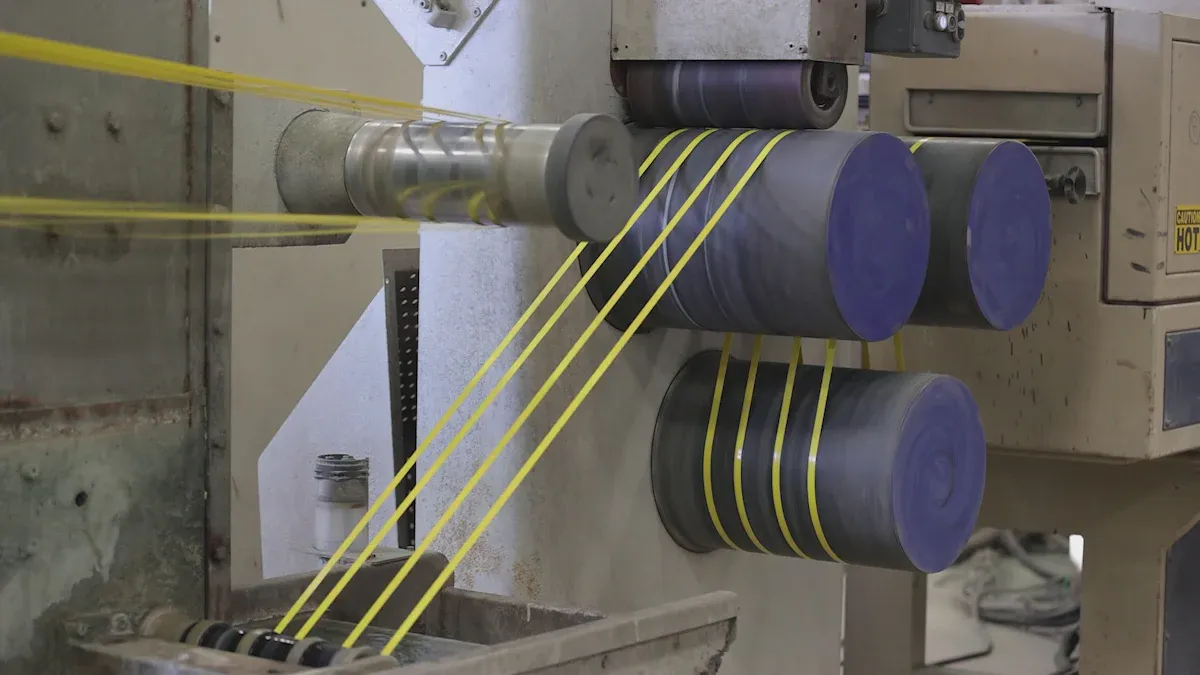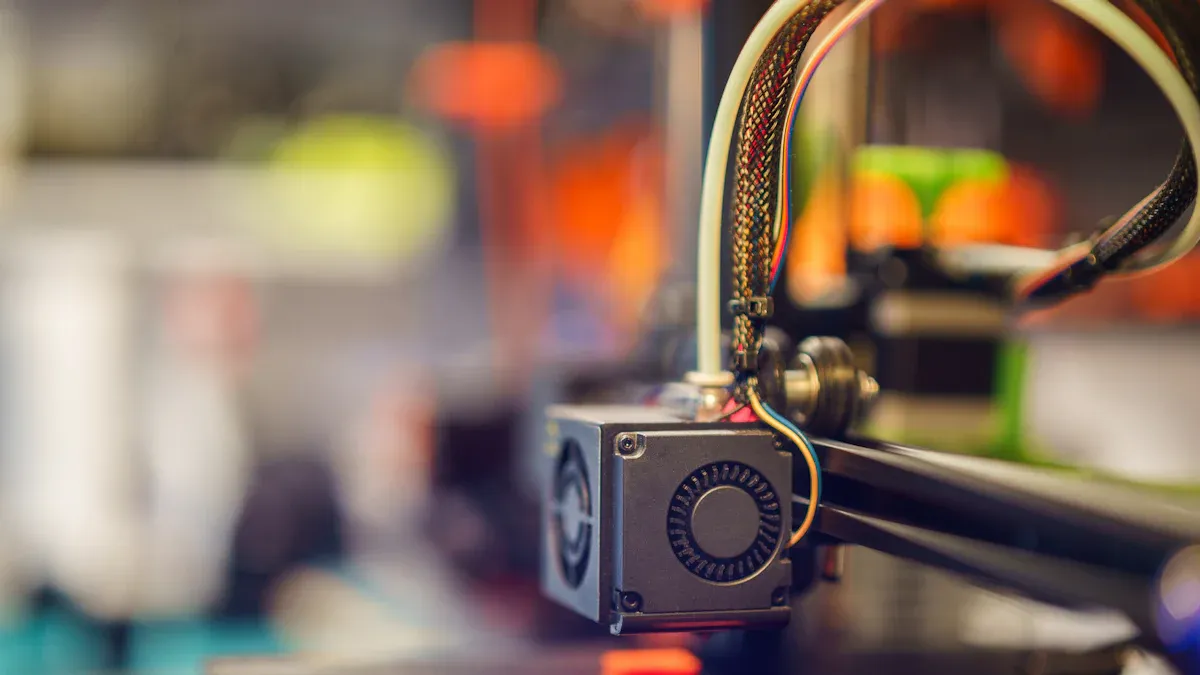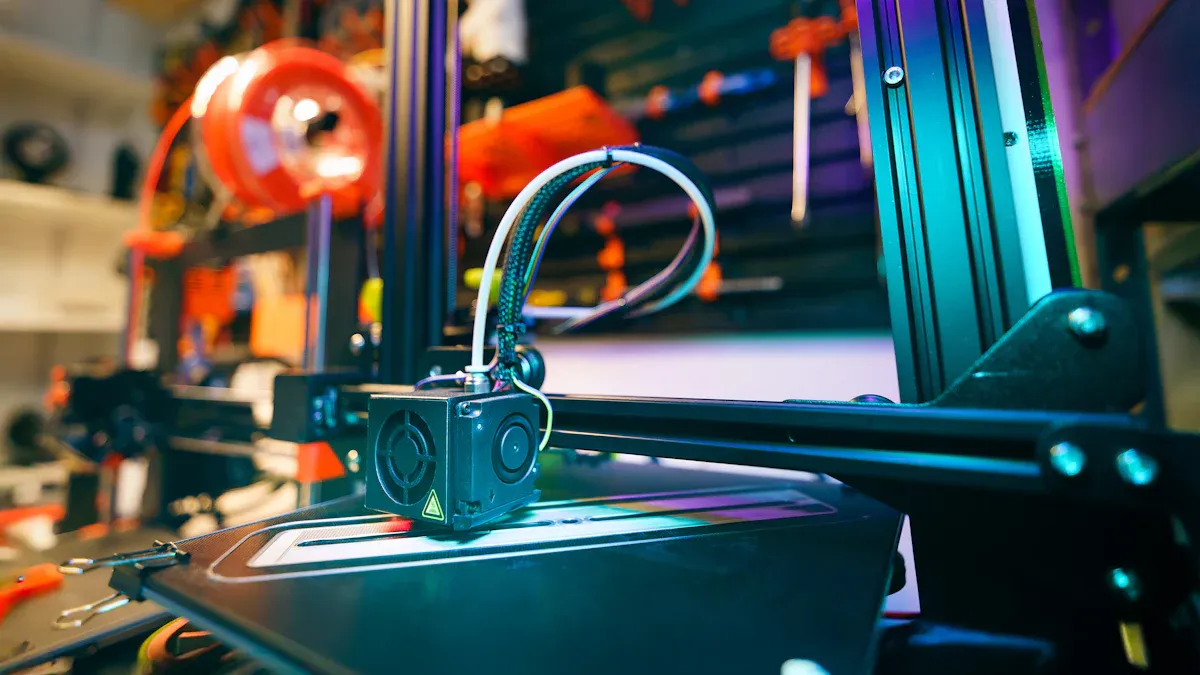
The twin plastic screw barrel shapes the efficiency and quality of modern extrusion lines. Market leaders highlight its role in sustainability and innovation.
- Manufacturers see demand rise as smart sensor networks and AI-driven controllers optimize energy use and reduce downtime.
- Twin Parallel Screw Barrel Manufacturers report strong adoption due to enhanced durability and customization.
- Single Screw Barrels and Single Plastic Screw Barrel Factories still play a role, but twin designs now dominate over half of the U.S. market.
Core Functions of the Twin Plastic Screw Barrel

Material Conveyance and Mixing
The twin plastic screw barrel plays a vital role in moving and blending raw materials inside the extruder. Engineers design the screw flights to grip and push plastic granules forward. This action ensures that the material moves smoothly from the feed zone into the compression zone. Researchers have studied how these barrels work and found several key points:
- Potente and Melish divided the conveying zone into feed and compression areas. They used force and torque balances to calculate the highest possible output, pressure changes, and the power needed to drive the screws. Their work shows that the twin plastic screw barrel delivers strong and steady material flow.
- Wilczyński and White observed that most plastic granules travel in the lower part of the barrel, close to the screw flights. The barrel and screw heat the granules as they move, which helps them melt evenly.
- Other experts, such as White and Bawiskar, created models that explain how the twin plastic screw barrel forms a melt layer and mixes solid and liquid parts. These models help factories understand and improve mixing and melting.
The twin plastic screw barrel ensures that every part of the material gets mixed and heated. This process leads to better product quality and fewer defects.
Melting, Homogenization, and Pressure Control
Melting and blending the plastic evenly is another core function of the twin plastic screw barrel. The barrel must also control pressure to keep the process stable. Engineers use several design features to achieve these goals. The following table shows how different screw parameters and process conditions affect melting, blending, and pressure:
| Screw Parameter | Impact / Numerical Detail |
|---|---|
| L/D Ratio | Higher L/D ratios improve polymer blending and plasticization by extending residence time and heat distribution |
| Compression Ratio | Higher compression ratios enhance plasticization and densification; optimal values depend on material type |
| Compression Ratios for Common Plastics | PE: 3-4, PP: 2.5-4, PS: 2-4, Rigid PVC (Granules): 2-3, Rigid PVC (Powder): 3-4, Flexible PVC (Granules): 3.2-3.5, Flexible PVC (Powder): 3-5, ABS: 1.6-2.5, PC: 2.5-3, POM: 2.8-4, PPE: 2-3.5, PA66: 3.7, PA1010: 3, Reinforced Polyester: 3.5-3.7 |
| Parameter / Aspect | Numerical Result / Description |
|---|---|
| Pressure in C-shaped chamber | Approximately 2.2 MPa |
| Pressure drop in intermeshing zone | 0.3 MPa |
| Pressure drop in reverse screw element | 0.5 MPa |
| Temperature increase due to pressure | 40 bar pressure causes ~20°C temperature rise |
| Optimal feed rate and screw speed | 3.6 kg/h feed rate at 95 rpm maximizes temperature and minimizes fiber breakage |
| Heat generation source | About 80% of melting heat generated by shear friction |
| Effect of screw speed on strain | Cumulated strain increases linearly with screw speed |
| Effect of feed rate on strain | Cumulated strain decreases with feed rate |
These results show that the twin plastic screw barrel can control how much heat and pressure the material receives. The right settings help the plastic melt fully and mix well. This control leads to strong, uniform products.
Self-Cleaning and Process Stability
The twin plastic screw barrel also helps keep the extruder clean and stable. The design of the screws and barrel allows for self-cleaning. As the screws rotate, they wipe each other and the barrel wall. This action removes leftover material and prevents buildup. Clean barrels reduce downtime and keep the process running smoothly.
Process stability is another benefit. The twin plastic screw barrel maintains even pressure and temperature throughout the extrusion process. This stability means that the machine can run for long periods without problems. Factories can produce more products with fewer stops and less waste.
Tip: Regular maintenance and monitoring of the twin plastic screw barrel can further improve process stability and extend equipment life.
Advancements and Real-World Impact of Twin Plastic Screw Barrel in 2025

Innovative Materials and Coatings for Durability
Manufacturers now use advanced materials and coatings to make the twin plastic screw barrel last longer and work better. Stainless steel, CPM10V, ceramics, and tungsten carbide coatings help the barrel resist wear and corrosion. These materials keep the barrel strong even when it faces high temperatures and pressure during plastic extrusion. Performance tests show that these coatings improve mixing efficiency and keep the process stable. For example, nitriding treatments can reach hardness levels of HRC50-65, which helps the barrel resist abrasion. Real-world data from factories shows that these improvements reduce downtime and prevent leaks. Maintenance teams also report that these barrels need fewer repairs and last longer, which saves money and keeps production running smoothly.
Laboratory trials, such as those using the Coperion ZSK 18 MEGAlab, help engineers test new materials and coatings. These trials measure how well the barrel handles different plastics and additives. The results show that innovative coatings improve thermal stability and wear resistance. Companies see fewer breakdowns and better product quality because of these upgrades.
Precision Engineering and Modular Barrel Designs
Precision engineering shapes every part of the twin plastic screw barrel. Factories use CNC machines and strict quality checks to make sure each barrel meets exact standards. Engineers measure screw straightness to 0.015 mm and surface roughness to Ra 0.4. These tight tolerances help the barrel mix and melt plastic evenly.
Modular barrel designs allow quick changes and repairs. Workers can replace worn sections without taking apart the whole machine. This design reduces downtime by up to 20% and cuts repair costs by up to 30%. The table below shows some key improvements:
| Parameter | Numerical Value/Range |
|---|---|
| Downtime reduction due to modularity | Up to 20% |
| Repair cost reduction due to modularity | Up to 30% |
| Nitrided surface hardness (HV) | 920 – 1000 |
| Alloy hardness (HRC) | 50 – 65 |
| Screw straightness | 0.015 mm |
| Surface roughness (Ra) | 0.4 |
These advances help factories keep their twin plastic screw barrels in top shape, leading to better performance and less waste.
Integration with Smart Manufacturing and Automation
Smart manufacturing and automation have changed how factories use the twin plastic screw barrel. Automated systems now control temperature, pressure, and speed with great accuracy. Manufacturing Execution Systems (MES) help track every step of the process. These systems boost production speed by 40-50% and cut downtime by up to 30%. Regular maintenance, guided by sensors and data, keeps machines running longer.
The table below highlights some measurable impacts:
| Improvement Aspect | Measurable Impact |
|---|---|
| Production Speed | Increased by 40-50% |
| Downtime Reduction | Reduced by up to 30% |
| Efficiency Improvement (MES) | Up to 25% gain |
| Material Flow Optimization | Uniform RTD, fewer defects and less waste |
| Energy Consumption | Lower than traditional methods |
| Operational Costs | Reduced through better resource use |
| Product Quality | Consistently improved |
Factories that use ISO9001-certified systems with advanced screw barrels see smoother operations and higher product quality. Customers get better products, and companies stay competitive in the market.
Efficiency, Product Quality, and Sustainability Benefits
The twin plastic screw barrel brings clear gains in efficiency, quality, and sustainability. Upgrades to motors and drives save 10-20% in energy. Heating energy drops by 10%, and cycle times fall from 30 to 15 seconds with better cooling. Waste heat recovery systems capture up to 15% of lost energy, lowering costs even more.
The table below summarizes these benefits:
| Efficiency and Sustainability Aspect | Supporting Statistic or Description |
|---|---|
| Energy Savings | 10-20% reduction |
| Heating Optimization | 10% less energy, cycle time halved |
| Waste Heat Recovery | Up to 15% of lost energy recovered |
| Plasticizing Rate | Increased from 104 g/s to 120 g/s |
| Recovery Time | Halved from 18s to 9s |
| Predictive Maintenance | Downtime cut by 15-30% |
| Eco-friendly Materials | Less friction and wear |
| Enhanced Product Quality | 90% fewer defects, better output |
| Waste Minimization | Lower raw material waste |
These improvements help factories make more products with less energy and waste. The twin plastic screw barrel supports sustainable manufacturing by reducing defects and using resources wisely.
Note: Companies like Zhejiang Jinteng Machinery Manufacturing Co., Ltd. use advanced engineering and strict quality systems to deliver reliable twin plastic screw barrels. Their products help factories meet the demands of modern plastics processing in 2025.
The Twin Plastic Screw Barrel stands at the heart of modern extrusion technology. Manufacturers gain higher efficiency, longer service life, and consistent product quality.
- Durable construction reduces replacement costs
- Precision engineering improves energy use
- Flexible designs support diverse applications
These features drive long-term success in a growing global market.
FAQ
What makes a twin plastic screw barrel essential for modern extruders?
Twin plastic screw barrels provide precise mixing, melting, and pressure control. These features ensure high product quality and efficient operation in advanced extrusion lines.
Tip: Consistent performance depends on proper screw and barrel design.
How often should factories maintain twin plastic screw barrels?
Factories should inspect and clean barrels regularly. Most experts recommend monthly checks to prevent wear, buildup, and unexpected downtime.
- Regular maintenance extends equipment life.
- Early detection of issues reduces repair costs.
How do manufacturers choose the right twin plastic screw barrel?
Manufacturers select barrels based on material type, output needs, and machine specifications. Consulting with experienced suppliers ensures optimal performance and durability.
| Selection Factor | Importance Level |
|---|---|
| Material Type | High |
| Output Requirement | High |
| Machine Model | Medium |
Post time: Jul-03-2025
